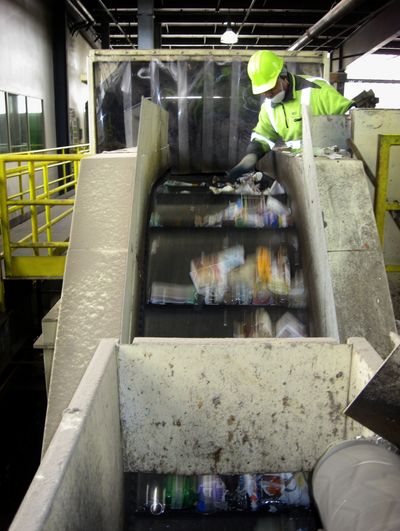Recycling program coming to Spokane
Single-stream plants capture more material

WOODINVILLE, Wash. – At the receiving end of the Waste Management recycling facility here, unsorted mounds of cans, bottles, cardboard and paper climb 15 feet up the walls.
Front loaders dump the material into a hopper feeding conveyors that, in the space of a few minutes, dump the separated material into bunkers, where it awaits baling for shipment.
The plant opened in September 2003 with the expectation its ability to process up to 9,000 tons of material each month would be sufficient for a few years, Manager Todd Vaught said. Within a few months, haulers were delivering 12,000 tons per month.
Competitors have since built two more major recycling plants in the Puget Sound area, he said, but the tide of human discards continues to overwhelm processing capacity.
The flood was loosed by widespread conversion to single-stream recycling that, by simplifying the disposal process, greatly increases household participation. The rate in Coeur d’Alene has more than doubled since single-stream was introduced last October.
Spokane will launch its single-stream program next year, with a new Waste Management sorting facility as its hub.
Although intended primarily to handle material from Eastern Washington and North Idaho, Municipal Relations Manager Ken Gimpel said the plant’s service area could extend as far west as Ellensburg, Wash., during the winter, when pass conditions might impede trucks hauling waste from the Kittitas Valley into Woodinville.
“We want the program to be, ultimately, regionwide,” Gimpel said.
The $18 million facility will be built adjacent to the Waste to Energy Plant on Geiger Boulevard just east of Spokane International Airport, he said. The project recently received a clean State Environmental Policy Act checklist, Gimpel said, so groundbreaking should take place later this year.
Completion is expected the end of summer 2012.
The plant will be able to process 89,000 tons of recyclable material annually, Gimpel said.
Scott Windsor, head of Solid Waster Management for the City of Spokane, estimated recycling volume will increase by 50 percent, to about 18,000 tons per year, when single-stream is introduced.
The participation rate, now about 50 percent, could climb to 70 percent, he said.
Windsor will present a proposed contract with Waste Management to the City Council Public Works Committee, and full Council, on Monday, he said.
The city budgeted $8 million for new trucks and carts this year, Windsor said. The money will come out of department reserves.
Increased efficiency from the use of fewer trucks and drivers, savings on landfill tipping fees, and revenues from the sale of recycled material should make the new system just about break even for homeowners, he said.
The city could further simplify waste disposal for consumers by going to year-round use of yard debris disposal bins that also accept food waste, a system already used in the county, Windsor said.
In Coeur d’Alene, where single-stream containers were introduced in October, the share of homeowners who recycle has jumped from 25 percent before October to 61 percent in May, Gimpel said.
Not only is the process simpler, the containers also accept more types of plastic as well as the greyboard used in cereal and beer containers, he said.
Gimpel said the bigger containers have allowed Waste Management to go to bi-weekly pickups in Coeur d’Alene, an efficiency that has kept hauling rates steady despite the investment in bigger bins and the trucks to handle them.
A frenzy of manual and mechanical activity awaits the material once it reaches the recycling plant.
Inside the Woodinville facility, one man grabs the obvious non-recyclables — sections of garden hose, for example — as a conveyor lifts the undifferentiated mishmash into the sorting area. Behind him, men, magnets, blowers, and optical scanners that sort glass and plastic by color, pluck through the continuous stream of stuff.
The plant operates 21 hours a day, five days a week, Vaught said, shutting down only for maintenance required by the wear and tear of handling so much material.
The 120 employees wear jumpsuits, masks, glasses and hardhats. Earplugs protect against the continuous roar.
Despite the installation of new equipment, no worker has been displaced, he said.
Vaught said the Woodinville plant he has managed for seven years was not built to be profitable, but to support recycling. His job is to control costs, he said.
The facility charges waste haulers to process the material they bring in, he said. Private haulers like Waste Management pass the cost through to consumers at rates set by the Washington Utilities and Transportation Commission.
But he added that high prices for aluminum, cardboard and some other materials are producing profits now.
The crushed aluminum cans eventually get wrapped around another 12 ounces of beer, he said.
The Chinese buy 75 percent of the fiber — cardboard and paper — the plant produces, and they are particular about quality, he said.
If plastic is found imbedded in one bale, they can reject the rest of the material in the container, he said, or an entire “booking” of 20 containers.
In theory, the whole lot would have to be shipped back to the United States with Waste Management footing the bill, Vaught said, but that has not happened since the plant opened.
“Quality is very important to us,” he said.
Vaught said Northwest homeowners help by being relatively meticulous material sorters themselves. Only about 5 percent of incoming material is actual garbage.
Gales of sorted commodities that emerge from the Spokane plant will be sold by a Waste Management team that searches the world for buyers, Gimpel said.
The recycling plant, together with the Waste to Energy Plant and the city’s composting program, will give Spokane one of the most comprehensive waste disposal programs in the country, Windsor said.
“It will be really good for the community,” he said.